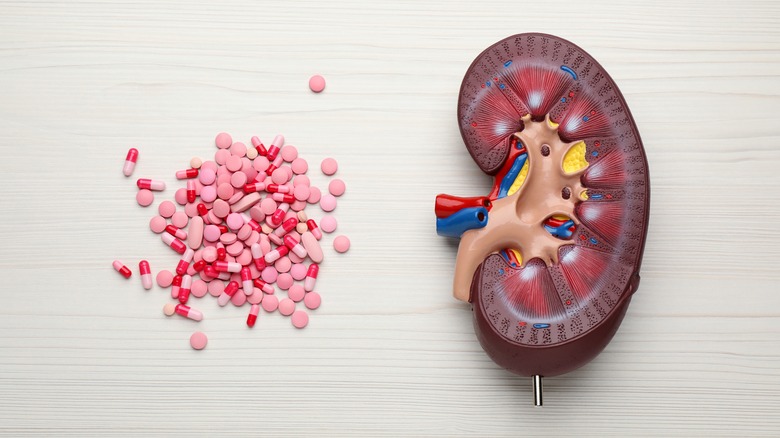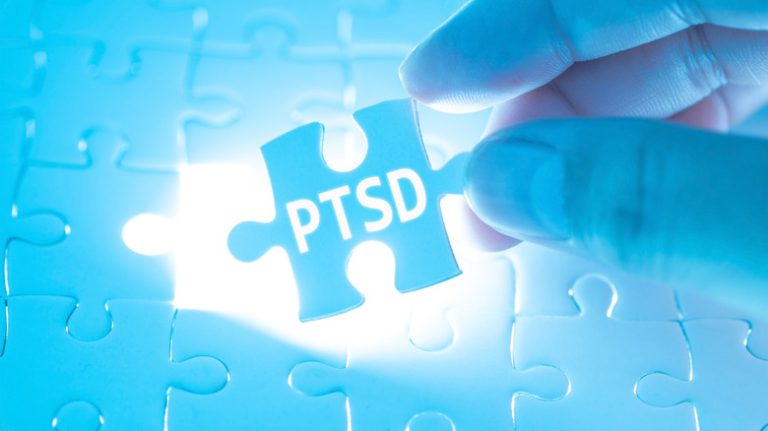Antipsychotic drugs are typically used to relieve symptoms of psychosis, like hallucinations or delusions, per Centre for Addiction and Mental Health (CAMH). But they have a wide variety of uses, like treating psychosis present in schizophrenia and Alzheimer’s disease, reducing anxiety in anxiety disorders, and balancing mood in bipolar disorder. However, antipsychotics can also come with a wealth of adverse effects, and kidney injury may be one of them.
Different types of antipsychotics are approved by the Food and Drug Administration (FDA) for particular uses, like treating Tourette syndrome, schizophrenia, and bipolar disorder (via Agency for Healthcare Research and Quality). But sometimes they can be used “off-label,” meaning that it’s being prescribed for a different treatment than it’s approved for (via Alzheimer’s Association). One such use is treating aggression, agitation, hostility, and delusions in Alzheimer’s patients, even though they aren’t approved to be used in this way. The list of concerns about using antipsychotics in the elderly is growing, according to WebMD.
Using antipsychotics to treat dementia

A 2024 study published in the Annals of Internal Medicine explored the effects of three different antipsychotics used “off-label” to treat symptoms of dementia in elderly patients (via WebMD). Researchers found that there was a one-and-a-half higher risk of acute kidney injury.
The medications analyzed in the study were Seroquel, Risperdal, and Zyprexa, common antipsychotics. When older adults took these drugs, they also were twice as likely to develop low blood pressure and acute urinary retention, or the incapacity to relieve their bladders. Risk of death, for any reason, also doubled. The drugs were also associated with an increased risk of pneumonia and heart attack.
These findings added to previous research, which has shown that using antipsychotics off-label in elderly populations has been associated with drowsiness, stroke, weight gain, falls, and deaths from any cause. In 2005, the FDA issued a black box warning for these drugs after discovering that dementia patients were up to 1.7 times more likely to die when taking them.
Be cautious of other adverse effects

Antipsychotic medications can be really effective in treating psychotic symptoms, but they don’t come without the risk of adverse effects (via American Family Physician). The benefits often outweigh the risks, but it’s important to understand these risks and possible complications.
There are first-generation and second-generation antipsychotics, each working differently to treat psychosis. The second-generation class of drugs, which is newer, can cause more metabolic issues, including obesity and type 2 diabetes. The older first-generation class, however, tends to be associated with movement disorders. Both types are linked to an increased risk of sudden cardiac death.
All antipsychotics, no matter the class or brand, are linked to some adverse effects, so while each person is different, it’s important to discuss possible side effects with your physician before starting on them (via CAMH). Some people may experience sedation while others will feel agitated and wired.
CAMH notes that movement effects, like tics and tremors, are common and will become more severe the higher the dose. You may experience dizziness and weight gain. Antipsychotic drugs can also increase the risk for diabetes.
Side effects will vary based on which drug you’re taking, what the dosage is, and what other medications you’re taking. Consult your doctor if you experience any side effects that concern you.




